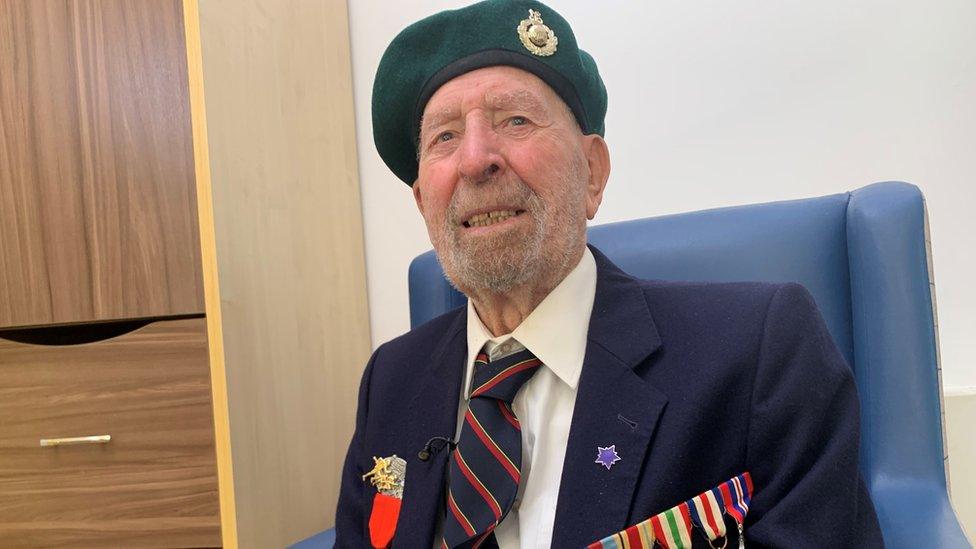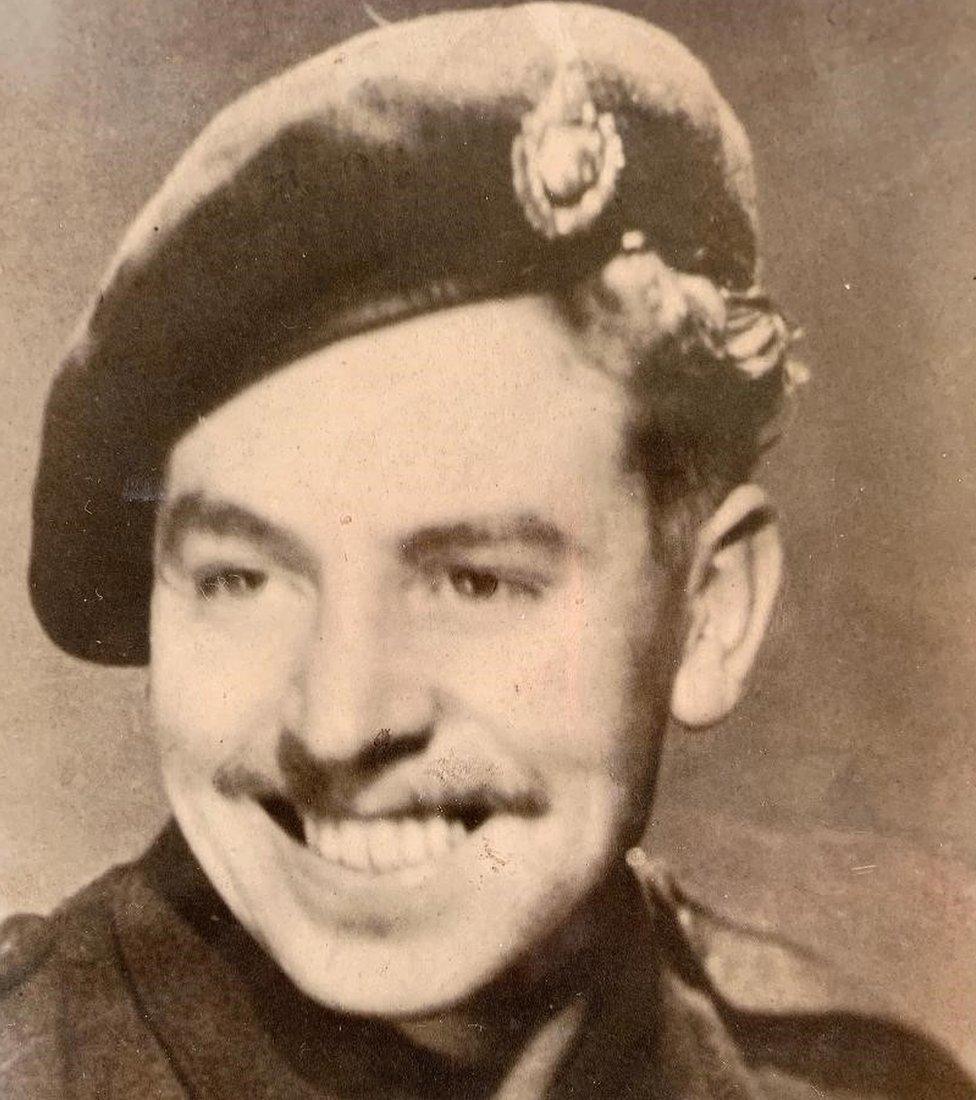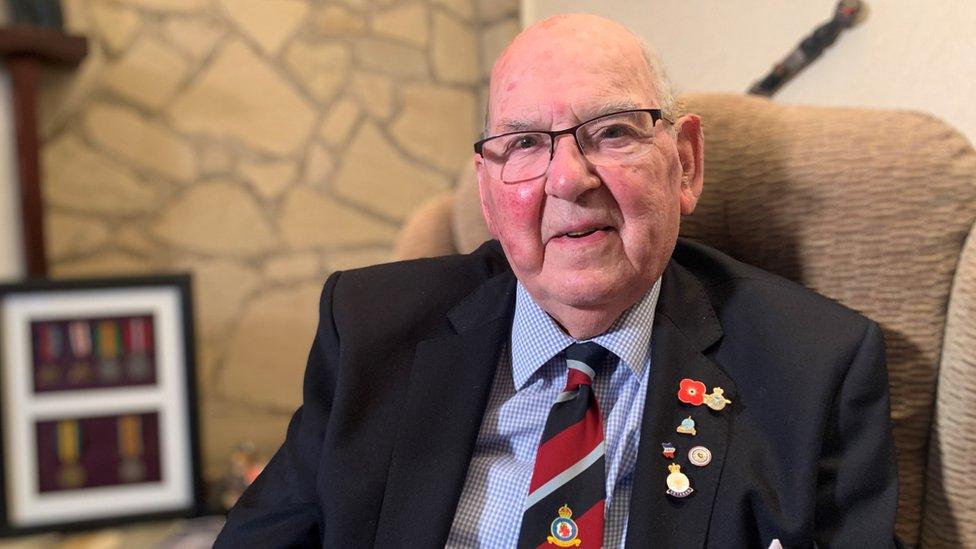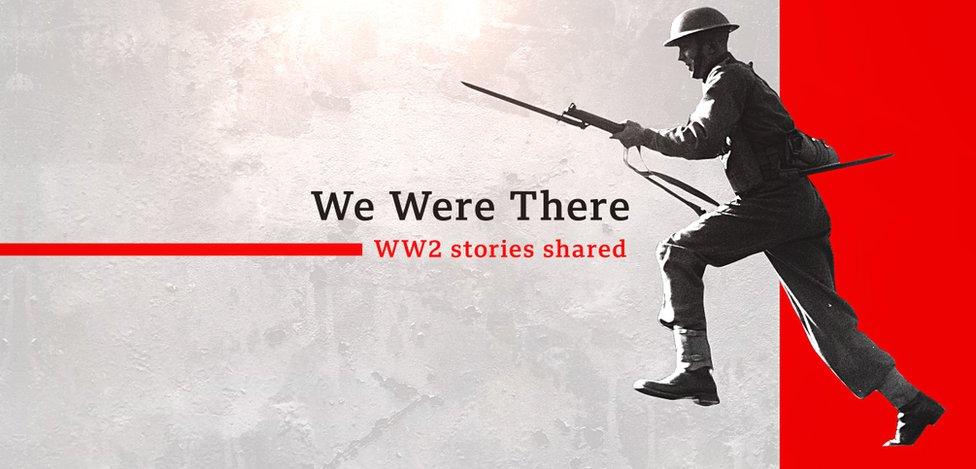Scots veteran recalls tears of Germany's child soldiers
- Published

Sandy Cormack is 100 years old and a Royal Marine from World War II
As the country marks Remembrance Day in which the fallen of two world wars are commemorated, veterans have been speaking about their first-hand accounts as part of a special archive project involving the BBC.
Sandy Cormack, who is 101 in January next year, was living in the east end of Glasgow when he signed up to join the war effort.
It was 1941 and the 19-year-old was about to embark on a whirlwind journey, initially training in the south of England, and then on to mainland Europe.
Postings for this Royal Marines Commando included Italy, Holland, France and Germany.
Before the D-Day landings of June 1944, Sandy was training at the Achnacarry naval base in Fort William where soldiers practised jumping off pontoons and navigating different terrain in readiness for the Allied invasion of Normandy.
In the end he did not take part in the largest seaborne assault in history. But he has stories he believes are important to tell.

Glaswegian Sandy Cormack went to Italy, Holland, France and Germany during his war service
As the final chapters of the war were being written, Sandy was sent to Germany.
He described what he saw: "Women and kids were down in the air raid shelters. Hitler had already indoctrinated them and told them they would never be taken prisoner - that British troops would kill them. They wouldn't come out of the air raid shelters. We used to shout down but they still wouldn't come out."
However, their breakthrough came when the unit's Roman Catholic padre, a Fr Costello who could speak several languages, persuaded the children and their mothers into the open.
"You put a bar of chocolate in their hands and it alters the whole war - as far as the children are concerned," he said.
Sandy Cormack, who is 101 in January next year, speaks to BBC reporter Aileen Clarke about his war-time memories
Sandy also spoke about encountering Germany's child soldiers. He explained: "The other thing that we experienced at that time were the soldiers - German soldiers. They were 12 and 14-year-olds because everyone else was up on the Russian front. Some of them used to start crying because again they had been told that they would not be taken prisoner, that they would be killed."
The father, grandfather and great-grandfather who lives in the Erskine home for veterans in Bishopton, Renfrewshire, admits that his memory has faded and it is increasingly hard to recall details.
But when asked if it was important to mark past conflicts, he said: "Aye, I think we should always have Armistice Day."

'We hid in the clouds to escape German fighters'

Gilbert Gray, who is 98, was a flight engineer who undertook 34 missions in world war two
The teenage Gilbert Gray lived a "sheltered life" in Dunfermline before the war years changed everyone's lives.
He admitted: "I didn't know what I was getting into when I volunteered to be aircrew."
At the age of 18, Gilbert left Fife and got on a London-bound train with fellow recruits, among them were "rude, crude Glasgow lads".
This was the start of a journey which would see him become a flight engineer ending up on board Lancaster bombers fighting the Germans.
Gilbert, who is 98, flew 34 missions including a crucial one on D-Day.
The shadow of death loomed largest in the air division with a 50% chance of not coming back alive.
After his first war operation Gilbert and his crew returned to base and entered the dining hall for something to eat. The veteran recalled: "There were four empty tables because of the 12 [aircraft], only eight of us had come back - four of our crews had gone. One crew was on their very first trip. That was my very first operation - it was a baptism of fire.
"I was not down in the dumps or anything - this is just what happened."
He added: "When I signed on I didn't realise that I was almost signing my life away."

As a flight engineer it was Gilbert's role to sit beside the pilot and keep control of the the fuel tanks. You had to be vigilant, he said.
And vigilance had to be in abundance on D-Day when Gilbert took part in his most important war mission.
None of the crews was told this was the big invasion. They knew they had to bomb German gun placements but were not informed that this was to help clear the way for the seaborne assault.
Gilbert Gray's rear gunner colleague Wally shouted "get into the cloud" which meant they could hide from the Germans
Gilbert explains the aircraft's near miss: "We dropped our bombs at about 5am and we were turning to return home. We had been told not to fly below the clouds because there were too many ships below firing at anything that morning.
"As we turned away we just happened to notice in the distance four little planes - German fighters.
"We spotted them and then we had red things flying past the aircraft - they were obviously firing at us.
"And my rear gunner Wally was shouting 'get into the cloud', and we did get into the cloud."
Gilbert, who lives in South Lanarkshire, said that on Remembrance Day each year he "remembers the lads" and the "lots of school-mates who were lost".
"It's a pensive, thinking day. There are many who go into deep mourning."


Ahead of the 80th anniversary of the end of World War Two, in 2025, the BBC is trying to gather as many first-hand accounts from surviving veterans as possible, to preserve them for future generations.
Working with a number of partners, including the Normandy Memorial Trust and the Royal British Legion, the BBC has already spoken to many men and women who served during the War - you can watch their testimonies here.


Do you or someone you know have memories of World War Two? Please share these experiences by emailing haveyoursay@bbc.co.uk, external.
Some of the stories collected may be shared with our partners and used on BBC News platforms.
Please include a contact number if willing to speak to a BBC News journalist.
You can also contact BBC News in the following ways:
WhatsApp: +44 7756 165803
Tweet: @BBC_HaveYourSay, external
Please read the terms and conditions and privacy policy
If you are reading this page but cannot see the form, visit the BBC website's mobile version to submit a question or comment, or email HaveYourSay@bbc.co.uk, external.
Please include your name, age and location with any submission.